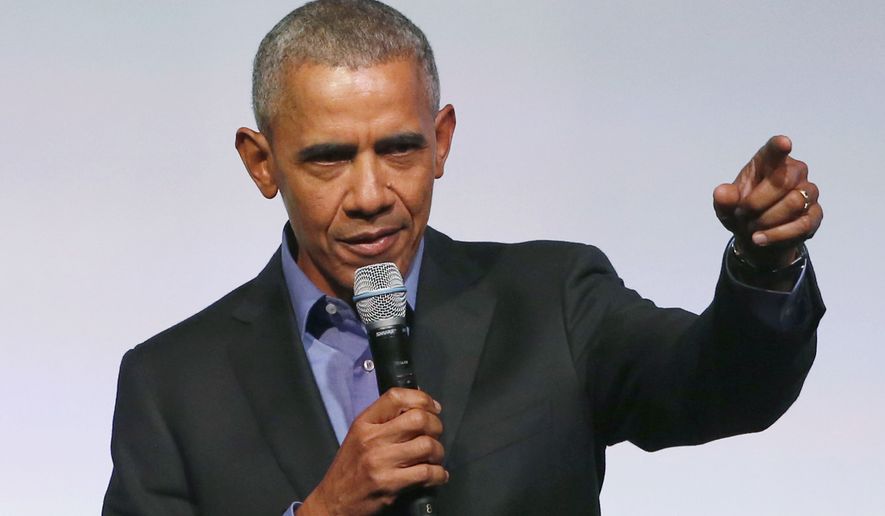OPINION:
Enemies of Donald Trump made a big mistake when they sent a spy into the midst of the Republican candidate’s campaign. Their secret agent was no debonair figure in the mold of “Bond, James Bond,” but a rotund and affable academic with no trailing retinue of femmes fatale. There will be no winning over of American public opinion on fashion points, and so the legitimacy of shadowy enterprise will rise or fall on its own merit, which appears to be not much.
For President Obama’s guardians of the nation’s security, the temptation to scrutinize the opposition party’s formidable champion was irresistible, and it took little more than unwelcome vibrations from Mr. Trump’s outsized persona to put in motion the carnival of sleuthing that came to be known as the Russian collusion investigation.
One Stefan Halper, a former State Department official known for friendly conversation on national security matters on the Washington cocktail circuit and Britain’s Cambridge University, was reliably said to have been dispatched by James Comey to win the confidence of Trump associates to extract tidbits of useful scuttlebutt. Conversational crumbs that a mouse would spurn were magnified and offered as reason to pour FBI and Democratic Party resources into a fanciful dossier accusing Mr. Trump of all manner of indiscretions, sexual and otherwise, which persuaded the Foreign Intelligence Surveillance court to unleash the hounds of hell.
Public disclosure of Mr. Halper’s role as a “confidential human source,” has set politicians and pundits arguing over the semantics of surveillance, whether someone tasked to wheedle information out of a political organization is a good guy, aka an informant, or a bad guy, aka a spy. This misses the point. The real question is whether it was appropriate for anyone — spy or informant — to be prying into a presidential campaign on the basis of charges orchestrated by a political opponent. The answer is no.
As detailed by this newspaper’s Rowan Scarborough, the FBI’s own Domestic Investigations and Operations Guide warns against the misuse of informants. The rule book prohibits spying on Americans in most circumstances and only allows what it calls such “otherwise illegal activity” when it is “limited or minimized in scope to only that which is reasonably necessary.”
The FBI blew past that stop sign. Scouting for evidence of Russian interference in U.S. elections is a little like searching for a copy of the U.S. Code in the cookbook section at Barnes & Noble. Sometimes the stomach overrules the head. At other times, conspiratorial suspicion of all things Trump overwhelms FBI protocol and whatever good judgment there may be at headquarters. FBI agents should know better, and most of them do.
The nation’s premier detectives showed little interest in other avenues that might have led to actual Russian interference. The agency did not examine the Democratic National Committee’s servers after they were said to be hacked by Russians. The role of the Clinton campaign in funding Russian intelligence contributions to the Trump dossier is not considered germane. The Obama national security team has not been held to proper account.
If any of these failures have prompted the slightest curiosity on the part of Robert Mueller, he hasn’t so much as raised an eyebrow beyond his own circle of crack (and highly expensive) operatives. Neither has he seemed interested in the question of why, if the Obama administration’s only motive for spying on Mr. Trump’s campaign was to guard the candidate, it did not similarly dispatch its agents to render the same service to the campaigns of Hillary, Bernie Sanders and Jill Stein?
The shadowy actions of the Obama intelligence community don’t add up. Mr. Trump was not far off the mark when he tweeted, “SPYGATE could be one of the biggest political scandals in history!” (The abuse of capital letters and the exclamation point his.)
Once the Department of Justice’s inspector general reports to the nation how its beagles managed to let Mrs. Clinton off the hook for apparent felonies in the handling of national security material, he should examine how Mr. Obama’s political differences with an adversarial presidential candidate could mushroom into suspicion of collusion with a foreign power that became a murky descent into domestic spying. Some might call that treason, or something close to it. Many of us are waiting impatiently for an explanation.




Please read our comment policy before commenting.